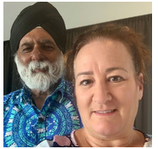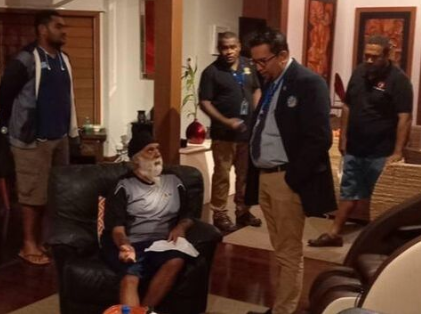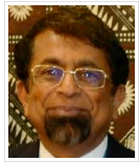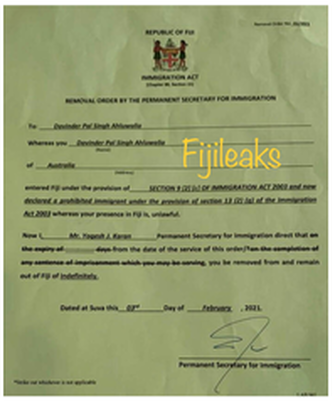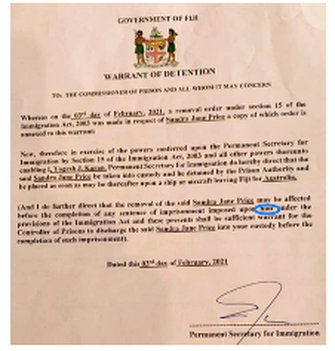"I believe the issues here are much more profound than the games played on the VC by the sneaky Fiji lot, who were out to protect the corrupt elements caught swindling the university of millions of dollars."
FLP leader Mahendra Chaudhry to Australia and New Zealand:
"Why not make human rights, workers rights, respect for the rule of law and democratic values, an essential part of your much flouted "Vuavale Partnership"?
Why the silence: asks Mahendra Chaudhry
It is disappointing that our regional development partners, Australia and New Zealand, have chosen to remain silent on the horrendous manner in which VC Prof Pal Ahluwalia and his wife were terrorised, manhandled and deported from Fiji.
That this despicable act was committed on the orders of Fiji's prime minister is of grave concern to the people of Fiji, as can be gleaned from both the mainstream and social media.
The background to this sordid saga must be well known to them through their representatives on the USP Council who lent their support to VC Ahluwalia against the machinations of the Fijian representatives on the Council. Indeed, all regional governments (except Fiji) stood behind the VC.
But I believe the issues here are much more profound than the games played on the VC by the sneaky Fiji lot, who were out to protect the corrupt elements caught swindling the university of millions of dollars:
• It is about respect for human rights and the rule of law.
• It is about countering acts of terrorism committed on citizens in contemptuous disregard of their fundamental rights.
• It is about employing politics of fear and intimidation as a tool to decimate the opposition and destroy democracy
• It is about gross misapplication of punitive laws, without following the due process, to get at their critics or those who choose to stand in defence of democracy and good governance.
The historical ties between our countries, the fact that thousands of our people now live in Australia and New Zealand, lend special significance to our relationship. It also places a duty on our larger and much better endowed neighbours to speak out on issues which threaten our basic rights, our wellbeing and security.
An assault on democracy anywhere is an assault on democracy everywhere, is a true maxim. You cannot defend democracy by maintaining silence when it is under attack, more so, in your own backyard.
Why not make human rights, workers rights, respect for the rule of law and democratic values an essential part of your much flouted "Vuavale Partnership"?
It is disappointing that our regional development partners, Australia and New Zealand, have chosen to remain silent on the horrendous manner in which VC Prof Pal Ahluwalia and his wife were terrorised, manhandled and deported from Fiji.
That this despicable act was committed on the orders of Fiji's prime minister is of grave concern to the people of Fiji, as can be gleaned from both the mainstream and social media.
The background to this sordid saga must be well known to them through their representatives on the USP Council who lent their support to VC Ahluwalia against the machinations of the Fijian representatives on the Council. Indeed, all regional governments (except Fiji) stood behind the VC.
But I believe the issues here are much more profound than the games played on the VC by the sneaky Fiji lot, who were out to protect the corrupt elements caught swindling the university of millions of dollars:
• It is about respect for human rights and the rule of law.
• It is about countering acts of terrorism committed on citizens in contemptuous disregard of their fundamental rights.
• It is about employing politics of fear and intimidation as a tool to decimate the opposition and destroy democracy
• It is about gross misapplication of punitive laws, without following the due process, to get at their critics or those who choose to stand in defence of democracy and good governance.
The historical ties between our countries, the fact that thousands of our people now live in Australia and New Zealand, lend special significance to our relationship. It also places a duty on our larger and much better endowed neighbours to speak out on issues which threaten our basic rights, our wellbeing and security.
An assault on democracy anywhere is an assault on democracy everywhere, is a true maxim. You cannot defend democracy by maintaining silence when it is under attack, more so, in your own backyard.
Why not make human rights, workers rights, respect for the rule of law and democratic values an essential part of your much flouted "Vuavale Partnership"?
Powers of a Permanent Secretary: Signing of Deportation Orders?
By ROBIN NAIR, Former PS, Fiji Ministry of Foreign Affairs
"Nobody can force a PS to sign a document like the one signed against the distinguished and noble Professor and University Administrator, Professor Pal Ahluwalia and Ms Janet Price who was only diligently and professionally doing their work, unlike some. PS’s should not succumb to bullies or to Ministers who do not understand government nor governance."
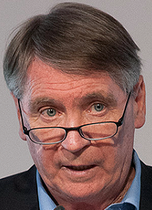 RICHARDSON
RICHARDSON A strong and achieving public service is a necessary condition for a competitively successful nation.The Permanent Secretary must be prepared to raise difficult and, at times, personally or politically sensitive issues, and to tell the Minister when he or she is at risk of reaching into areas in which, for reasons of either law or prudence, they should not try to make decisions or exercise influence.
The strength of a Minister-Permanent Secretary relationship can be measured, in part, in the capacity of the Permanent Secretary to ‘speak truth to power’ – that is, to deliver non-partisan policy advice to their Minister even if it is unwelcome.
Perhaps one of the most recognised and distinguished Permanent Secretaries in the Australian Public Service in recent times, was Dennis Richardson, now retired. He was a quintessential Permanent Head and understood the professional role of Permanent Secretary.
Richardson’s career is unparalleled in the modern era, given its length and the number of senior public service positions held. Upon the announcement of Richardson’s intention to retire, the then Prime Minister of Australia, Malcolm Turnbull praised Richardson’s “consistent professionalism” and noted his ability to work with both sides of politics over a long career. I, myself, had the privilege to work alongside Dennis several times during my 23 years in the Australian Public Service.
Dennis made the Canberra crowd sit up straight at his final address to the National Press Club when he branded bureaucrats who do not speak their minds to politicians as "cowards".
Pressed at the National Press Club in May 2017 on whether the rapid pace of modern politics made it harder for bureaucrats to give “frank and fearless” advice, Richardson gave a typically characteristic response,
“I think public servants who say that are simply cowards,” he said. “I have never worked for a prime minister or for a minister with whom I’ve not been able to talk frankly. I’ve never worked with a minister with whom I’ve not had a disagreement and a few tense moments, the same with prime ministers,” he said.
“It is about influencing decision-makers for an outcome that you think is the right one. And therefore, how you go about that influence is, really, you exercise the full range of skills that you would inside your own family.”
The strength of a Minister-Permanent Secretary relationship can be measured, in part, in the capacity of the Permanent Secretary to ‘speak truth to power’ – that is, to deliver non-partisan policy advice to their Minister even if it is unwelcome.
Perhaps one of the most recognised and distinguished Permanent Secretaries in the Australian Public Service in recent times, was Dennis Richardson, now retired. He was a quintessential Permanent Head and understood the professional role of Permanent Secretary.
Richardson’s career is unparalleled in the modern era, given its length and the number of senior public service positions held. Upon the announcement of Richardson’s intention to retire, the then Prime Minister of Australia, Malcolm Turnbull praised Richardson’s “consistent professionalism” and noted his ability to work with both sides of politics over a long career. I, myself, had the privilege to work alongside Dennis several times during my 23 years in the Australian Public Service.
Dennis made the Canberra crowd sit up straight at his final address to the National Press Club when he branded bureaucrats who do not speak their minds to politicians as "cowards".
Pressed at the National Press Club in May 2017 on whether the rapid pace of modern politics made it harder for bureaucrats to give “frank and fearless” advice, Richardson gave a typically characteristic response,
“I think public servants who say that are simply cowards,” he said. “I have never worked for a prime minister or for a minister with whom I’ve not been able to talk frankly. I’ve never worked with a minister with whom I’ve not had a disagreement and a few tense moments, the same with prime ministers,” he said.
“It is about influencing decision-makers for an outcome that you think is the right one. And therefore, how you go about that influence is, really, you exercise the full range of skills that you would inside your own family.”
